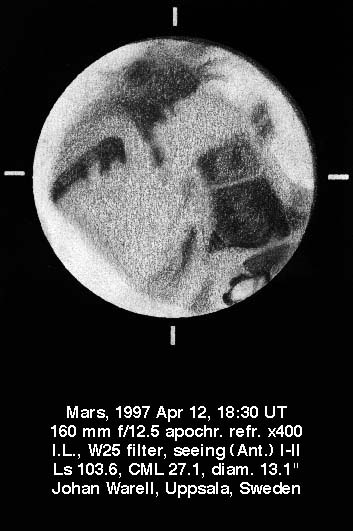

Very good seeing conditions. Niliacus Lacus was much mottled with darker condensations, well separated by Achillis Pons at a slight angle, and considerably less dark than M Acidalium (striking!). Acidalium dark and mottled, with Callirhoes Sinus and Tanais well marked. Acidalium was well marked to the N by a bright bridge separating it from very dark Baltia-Hyperboreus Lacus, extending N to the NPC edge. Nilokeras was rather dull in haze with two enhanced segments. A dusky small spot seen just p. Niliacus Lacus - Siloe and Dirce Fons? Callirhoe well marked. Oxia Palus dark, small and well separated from Margarithifer Sinus. Mare Erythraeum somewhat mottled but less so than Acidalium and Niliacus; also the mottled regions were of larger spatial sizes. Two narrow extensions to the N border of Margarithifer-Eos. Aurorae Sinus dark and prolonged into Juventae Fons and Agathodaemon which were both shrouded by haze, as was dusky Solis Lacus just at the f limb. Erythraeum was darkest just N of Argyre I, and extended gradually into dusky Noachis-Pandorae Fretum-Deucalionis Regio of homogeneous intensity. Argyroporos band suspected. Meridiani Sinus-Sinus Sabaeus also showed internal structure in the form of two Meridiani prongs and extension of Iapetis Insularum.
NPC dark border was very dark and segmented. Its outline was sharp and asymmetric, being narrower in radius towards the f. limb. In IL and W58, producing high image intensity, the f. NPC was slightly shadowy and separated from the main very bright part by a thin dusky line.
In W58 Deucalionis bright at ev. limb; Chryse-Xanthe
evident. Tempe bright in w25. In IL the evening and southern hazes bluish
and Xanthe-Tempe yellowish, NPC white. Southern haze bluish in W25. With
W38A the limbs were prominent, brighter over Xanthe-Tempe and Aeria, the
NPC was larger than in IL and an equatorial cloud band of intensity Faint
was visible.
Observer:
Johan Warell
Coordinator, Nordic
Mars Observers
Wennerbergsg. 11
S-754 21 Uppsala, Sweden
E-mail: johan.warell@astro.uu.se